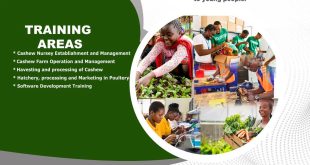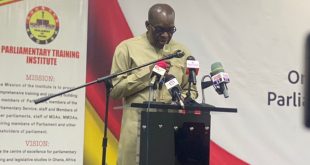The Open Forum for Agriculture Biotechnology (OFAB), has organized a one day media engagement workshop to bring clarity to important issues surrounding agricultural biotechnology, with focus on the benefits of the Pod Borer Resistant (PBR) Cowpea seed developed by the Council of Scientific and Industrial Research (CSIR) in Ghana.
The event, which took place at the Kintampo Municipal Hall, saw over 30 journalist in the Bono East region participating in the workshop with the aim of providing them with a comprehensive understanding of the PBR cowpea seed, its potential advantages, and the role of biotechnology in addressing challenges facing the agricultural sector.
The Pod Borer Resistant Cowpea, also known as Songotra T, is an improved variety of the conventional Songotra and Ghana’s first commercially approved Genetically modified organisms (GMO).
The seed is a product of modern biotechnology techniques, which have been employed to increase its level of crop protection through the introduction of resistance against maruca vitrata which destroys yields by boring the pods of cowpea
OFAB emphasized the importance of biotechnology in contributing to sustainable agricultural practices and food security. The organization stressed that biotechnology offers innovative solutions to address various challenges facing agriculture, such as climate pest and disease management, and food quality and safety.
During the event, experts from CSIR and other relevant organizations provided detailed presentations and engaged in discussions with the media participants. They shared insights into the development and testing of the PBR cowpea seed, as well as the potential applications of biotechnology in other crops and agricultural systems.
The Executive Director for Media Platform on Environment and Climate Change, who doubles as a member of OFAB, Mary Ama Kudom-Agyeman, in an interview with the media said cowpea is an essential commodity for Ghanaians and the release of the Pod Borer Resistant Cowpea, will help cowpea farmers to increase their yields without spending much on pesticides.
She further explained that, the Songotra T, is genetically modified to battle maruca vitrata from infesting cowpea at all stages. She expressed confident that the improved cowpea will be available in the market latest by 2025.
“Cowpea has a lot pf positive significance on the country, it serves as a source of income for farmers and also as a source of protein but cowpea farmers finds it difficult to combat insects especially maruca.
“The maruca attack the cowpea from its early stages through to when they are harvested. Farmers spent a lot of money in combating these maruca in terms of spraying their farms and even with that, they loose a lot of their yields.
“Instead of farmers harvesting 10 to 15 bags of cowpea, they will only harvest 2 or 3 bags as a results of the maruca infestation in their farms and that has make the prices of cowpea very high in the country, so our scientist from Ghana have done a lot of research and have come out with this improved Songotra.
“The products are now with seed growers and companies and we believe that we have to propagate this new products to our farmers and the country at large and hopefully, the Songotra T will be on the market next year and that will help reduce the cost of cowpeas in the market.” She said
Principal Research Scientist of CSIR – Science and Technology Policy Research Institute (STERI), Dr. Richard Ampadu-Ameyaw, stressed on the importance of accurate and balanced reportage on biotechnology by highlighting the need for journalists to consider the scientific evidence and the potential benefits of these technologies.
“We all know that journalists are trained to inform the public but the point is, if you lack knowledge and understand about the issue at hand, how can you educate the populace about it.
“So today we have met journalists to give them first hand information about Songotra T so they can also educate the populace about it benefits especially cowpea farmers in the country.” He said.
According to him, the notion, that GM foods are poisonous and not good for human consumption is not true and should be treated with the contempt it deserves.
“The truth is we scientist take cowpea products case by case, most at times, people have the notion that we use chemicals to provide GM foods which is not true.
“For instance, we used a soil-dwelling bacterium in modifying the gens of our cowpea in order for it to resist pests, so the fear in people that genetically modified foods are harmful is not true.” He explained.
Dr. Richard Ampadu-Ameyaw continued, “Some of us believe that some people are deliberately spreading fake news about genetically modified foods to protect their companies at the expense of humanity, they feel like farmers will not patronize their pesticides and fertilizers due to these GMOs and therefore they are doing anything within their powers to make the GMOs unpopular among farmers.
“The truth about the GMOs are available for everybody to know at the official website of the World Health Organization, I will entreat all and sundry especially farmers to patronize GMOs especially the Songotra T because it will help them to increase their production while relying less on pesticides to combat infestations in their farms.
On his part, Dr. Daniel Osei Ofosu, who is a Senior Research Scientist at Biotechnology and Nuclear Agriculture Research Institute, explained that, the Pod Borer Resistant (PBR) Cowpea seed, has met all the safety assessment of GM foods which are direct health effects (toxicity), potential to provoke allergic reaction (allergenicity), specific components thought to have nutritional or toxic properties, the stability of the inserted gene, nutritional effects associated with genetic modification, and any unintended effects which could result from the gene insertion.
The Open Forum for Agriculture Biotechnology (OFAB) encouraged the media to play a crucial role in disseminating information about agricultural biotechnology and contributing to informed public discourse on this important topic.
Benefits Songotra T to the Economy
- PBR Cowpea is expected to benefit Africans and citizens who rely on cowpeas for food and feed.
- PBR Cowpea is expected to improve national food security and have a positive effect on income generation and job creation
- PBR Cowpea is expected to impact positively at many levels both locally and nationally.
- The international benefits will accrue when there is increased food security and sustainability of food production in African countries.
National contributions
- PBR Cowpeas are expected to impact positively on the GDP of the country.
- An increased production can trigger exportation which will bring in foreign exchange especially from West African countries where large markets exist.
- Price of the PBR Cowpea is likely to be dictated by forces of demand and supply in the country,
- PBR Cowpea will not make Africa dependent on foreigners for sood or food, given that the Cowpea has been developed by an international public-private sector consortium under a royalty free license.
- PBR Cowpea is now in a few countries because these ones have their biosafety regulatory systems functioning
Environmental Benefits
- Reducing pesticides use and improves public environmental health
- Poor insects visitation implies reduced grain yield losses and production can increase by at least 20%
- Higher and better quality production implies good price, income and improved livelihoods hence strengthening local communities
- Growing PBR Cowpea help reduced environmental pollution as compared to the conventional Songotra.
Social – Economics of PBR Cowpea
- Songra T cooks and taste the same as conventional Songotra
- It is an improved variety rather than a new variety
- It provides more reliable harvest and better grain quantity that Songotra
- Requires reduced pesticides use (0-2 applications) compared to 6-8 applications in conventional Songotra hence reduced production cost by farmers
Source: Elvisanokyenews.com
 ElvisAnokyeNews.com Latest News, Politics, Health, Education & More
ElvisAnokyeNews.com Latest News, Politics, Health, Education & More




